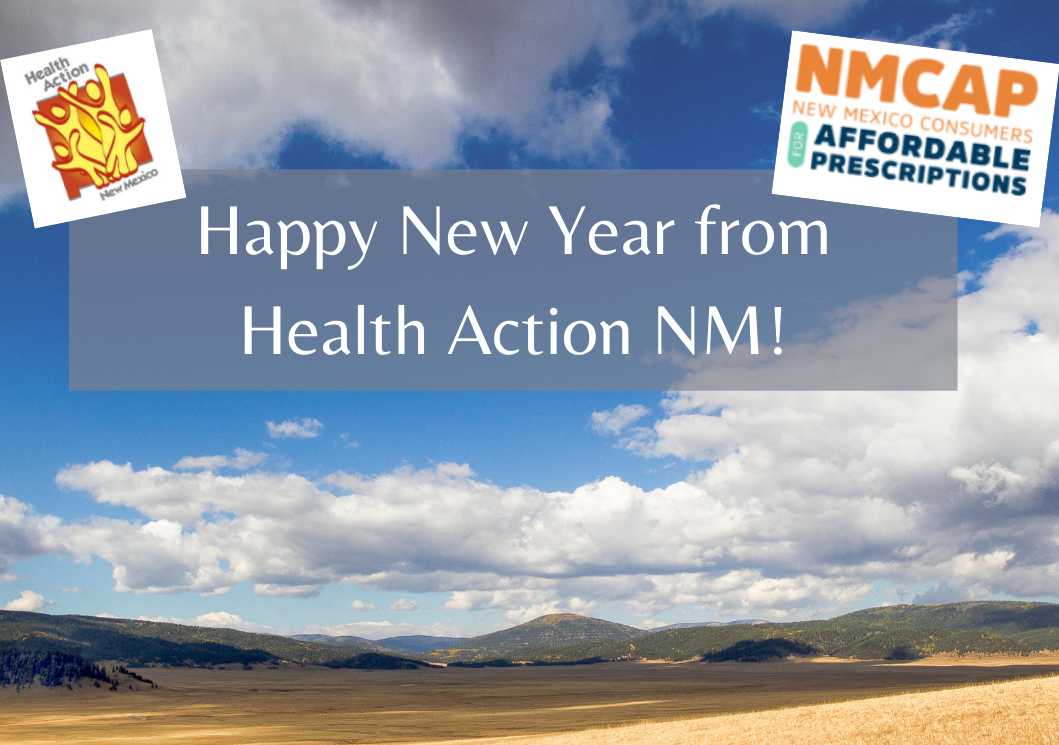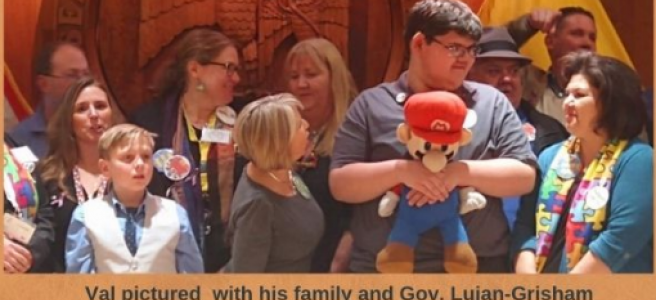
Dear Health Action New Mexico Supporters,
Our HANM Board and Team extends our best wishes for a peaceful and safe New Year’s holiday.
We have all passed through a rare moment of history as the pandemic has swept through our communities and impacted our lives in unimagined ways. While some express a desire for a return to “normal”, normal will never be for those who have suffered devastating loss and major changes to their lives. Due to the pandemic, we can no longer deny that “normal” was filled with major inequities including access to health care and health, was molded by deeply embedded racism, and among other things, left us in the lurch with a hollowed-out public health system. Our task is to not return to the old normal, but to instead, craft a new reality that addresses in bold ways the serious challenges and social justice issues that the pandemic laid bare. Our systems and institutions must be fundamentally reconstructed.
Health Action New Mexico (HANM) has spent 25 years advocating for system changes built on patient rights and the access of all New Mexicans to the basic right of affordable, accountable health care. In the 2020 Session, we worked on issues of affordable health coverage including the popular Medicaid Buy-In and consumer relief efforts from of the high costs of medications.
Currently HANM is working in 5 advocacy areas. In selecting our issues, we draw on the policy solutions and innovation from across the country, while learning realities from grassroots communities in NM and crafting our own NM responses for change.
1) We are excited to join other states in taking head-on the structural issue of unaffordable prescription drug prices. The ONLY part of health care that has no regulation is the setting of drug prices by manufacturers. As a result, escalating drug prices are a main driver of increasing healthcare costs and making necessary medications out of reach of many people. A HANM commissioned poll on prescription drug affordability this fall by GBAO Polling found 44% of New Mexicans reporting not filling a prescription or missing medications due to costs. This is double the national rate. HANM and other key partners such AARP have formed a NM Consumers for Affordable Prescriptions Coalition and will introduce legislation to set up a Prescription Drug Affordability Board as MD and MN have already done and 14 states are reviewing legislation to do so. Read more about it at the Coalition website: https://NewMexicoCAP.org. Or better yet consider becoming a member and have your organization or business do so as well.
PDAB Patient Story:
Meet Mr. Val Anaya:
- Lives in Socorro NM
- Husband, and father of two
- Member of Government Abilities Planning Council, on the El Camino Real Housing Authority, Emergency Housing for Socorro County, Valencia County, Torrance County, and Taos County, Elevate the Spectrum
"My wife works at New Mexico Tech, she does conference coordinating work for the different facilities there at New Mexico Tech, and we’re covered under New Mexico Tech’s program of Insurance. So she pays close to $800 a month for a family of four, and even with that, there were times that my insulin bill was $400 a month...Healthcare is always an issue — it’s enough when you’re in good health, but if you have any kind of condition, you know, even with insurance, copays end up being quite high, and prescriptions are quite high, so, it’s rough."

2) Half of the uninsured in NM are Medicaid or BeWell Exchange eligible for low cost or no cost health coverage but are unaware of their eligibility or, for various reasons, have not investigated the possibility. HANM has been working with the Tax and Revenue Department and other stakeholders to set up an Easy Enrollment system. Starting in 2022, uninsured tax filers will be notified of their eligibility for coverage and will link them up with coverage, in come cases by simply checking a box. Enabling legislation for Easy Enrollment will be in this session and your support is appreciated. Learn more at https://www.healthactionnm.org/easy-enrollment
3) HANM is working on a small but important project: Rural Voices for Covid Recovery. We have convened six small rural collaboratives to identify regional gaps in Covid relief, develop and support local solutions and work for new community realities as Covid recovery begins. It is not only essential that NM rural communities be at the table but that we the public and decisionmakers hear and learn from their resilience. You can learn from some of their conversations at our blog: https://www.healthactionnm.org/
4) HANM chairs the NM Dental Therapy Coalition which continues to monitor and contribute comments to the rule making process of the 2019 dental therapy licensing legislation and work to ensure implementation of legislation in NM. We also work as an ally to the tribes and Southwest Indian Polytechnic Institute in setting up dental therapy programs in Indian Country. We are past a time when affordable dental care is not integral to overall healthcare.
5) HANM is committed to public education of the public health issues of oil and gas pollution in our state. We held a recent webinar on public health and climate change, are a member of the NM Methane Coalition and testify on health issues and pollution.
HANM is a privately funded non-profit. Our legislative work is not covered by private foundations and only your contributions allow us to do this advocacy as well as other work not covered by philanthropy. We are a small organization taking on the biggest issues preventing access to healthcare for New Mexicans. Please make a vital contribution so we can sustain and grow our work. You can give by credit card at https://app.mobilecause.com/form/F6rqeQ?vid=fqfqm or by mailing a check to HANM, 3700 Osuna Rd NE, Ste 504, ABQ, NM 87109.
Thank you for your generosity and continued support!
Barbara Webber
Executive Director
Health Action




